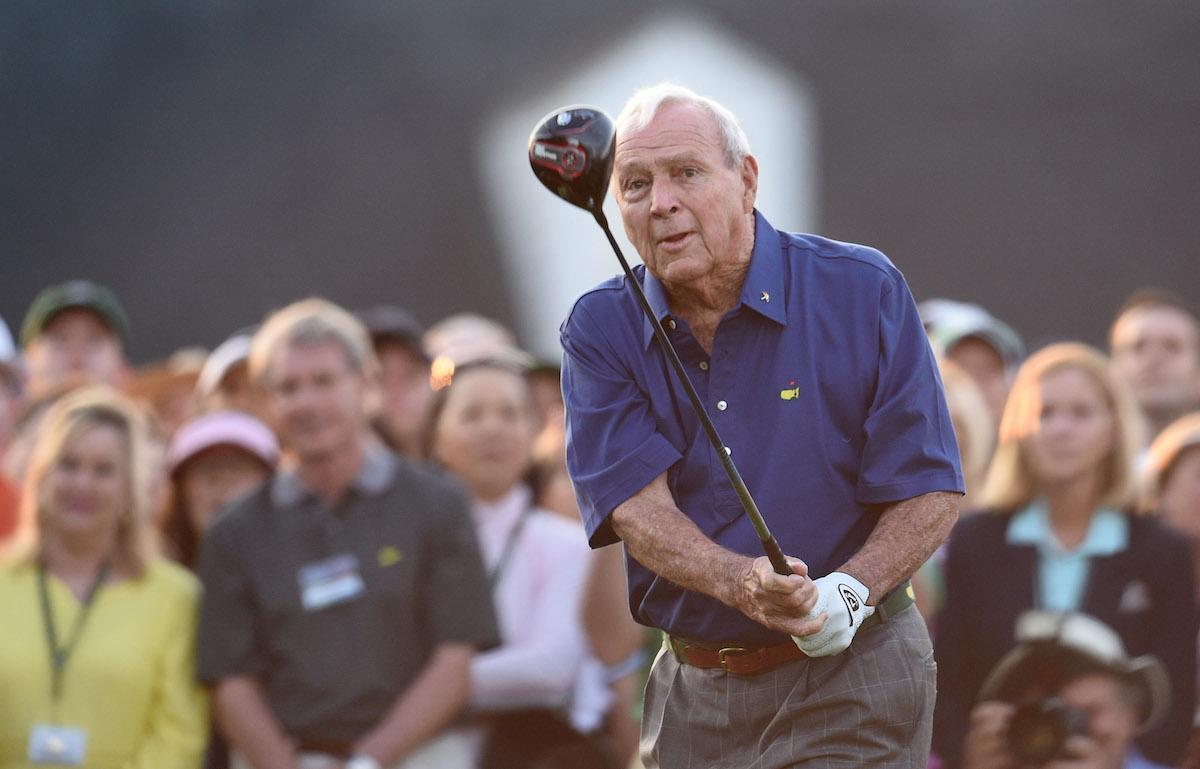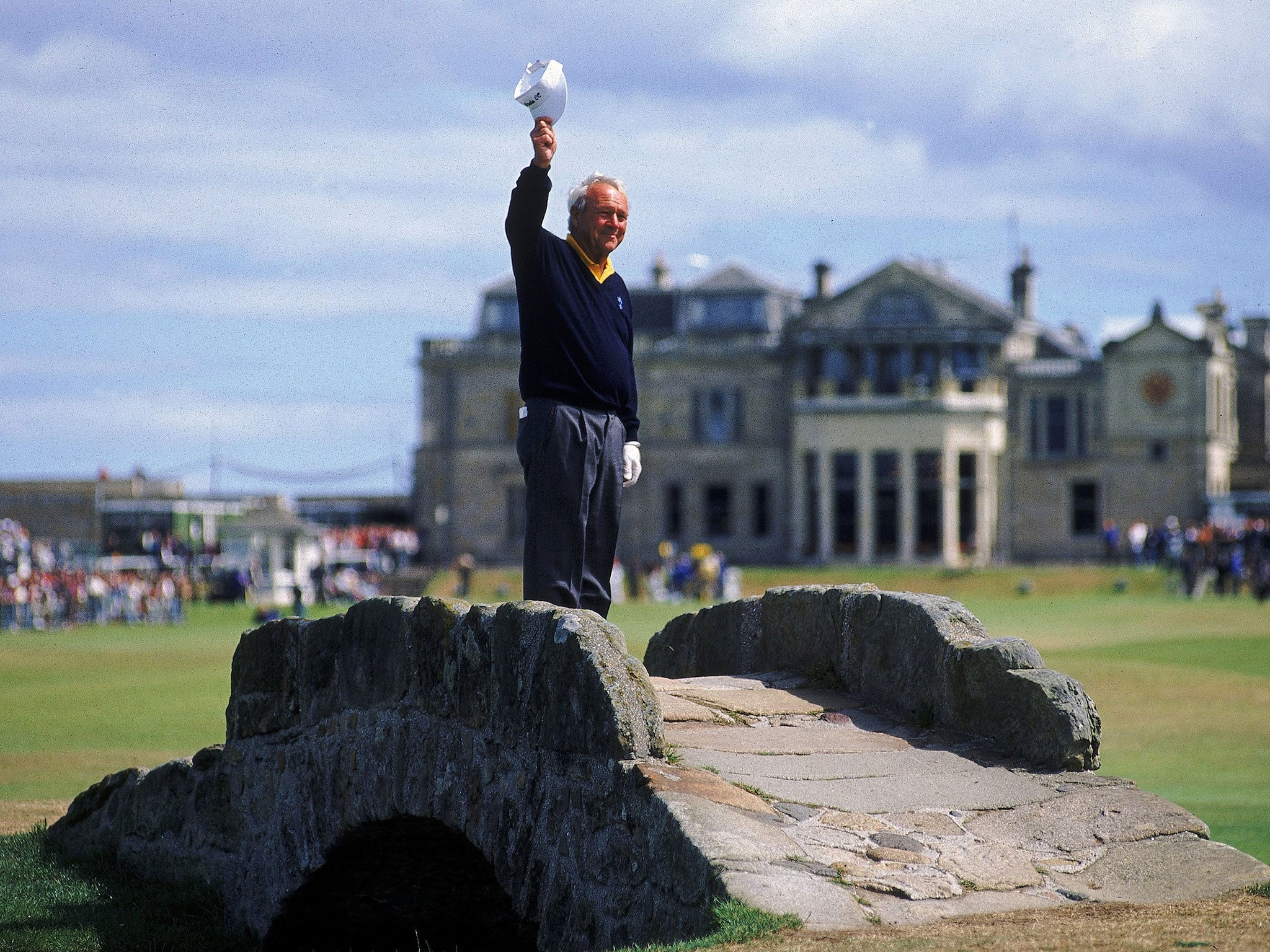Ryder Cup: Arnold Palmer would have appreciated Europe's rookie count
American who passed away on Monday aged 87 loved to upset the odds

The American TV networks were alive on Monday to the sound of how the Europeans are going to get damaged in this week’s Ryder Cup. NBC led the line with the argument that captain Darren Clarke’s team, with its six rookies, is the worst there has been. “I mean, with all those rookies… and when you lose [Ian] Poulter, it’s like tearing your heart out,” said Johnny Miller, who was twice on a winning American side. This could be the year the United States win by five points, he suggested.
The death of Arnold Palmer, with the collective desire it has furnished the host nation team with, adds to the poignancy and the sense that things will be different after 10 years of European dominance. “Our team will keep Mr Palmer’s family in our prayers and will draw from his strength and determination to inspire us,” said American captain Davis Love III.
It should be said before those looking for some retribution for eight defeats in 10 tournaments get ahead of themselves that Palmer would have taken some pleasure in the team Clarke has assembled.
If there is a day which epitomises what he came to stand for in golf then perhaps it was June 18 1960, at the Cherry Hills club in Colorado, when he began the final round of the US Open seven strokes and 14 players behind and was told by Bob Drum of the Pittsburgh Press that winning was beyond him. His indignation saw him drive the first green, 346 yards away, and make the first of four consecutive birdies, part of a final-round 65. Palmer and the word “charge” have been inextricably bound together ever since.
Though Palmer went on to be a byword for the new commercialisation of the sport - salvaging our own fraying Open by his mere presence at it and becoming the first professional golfer to collect $1m career earnings - it was the beautiful lack of complication and pretention for which he will be remembered. Rookies and the established competitors were all the same to him. Experience or no experience: you just played the game.

Of course, he would have espoused an unapologetic desire for America to win, had he lived to see the 41st Ryder Cup. But those rookies of Clarke’s would have interested him, and perhaps none more than Andy Sullivan, the individual who brings personality to the piece for Europe. Sullivan was stacking shelves at Asda 10 years ago and in some ways he is the new manifestation of the working class ethic which Poulter has been across the course of the last eight years.
“Sure I’ve got the personality for the Ryder Cup,” he said at the weekend. “I know the crowd are going to call me a dumpy, fat Englishman and that sort of thing, but I’m the sort of person who embraces that and thrives on it.”
Palmer was an Everyman, too, despite the telegenic looks which saw him burst out of the black and white small screen on to the American consciousness in the late 1950s. He was the green-keeper’s son born into Depression Era Youngstown, Pennsylvania, who did not forget his antecedents. “The everyday man’s hero,” as Jack Nicklaus described him on Monday. “From the modest upbringing, he embodied the hard-working strength of America.”
There has certainly been more pretension about the way the American side has been assembled. A “Task Force” was assembled amid the recriminations of the third successive Ryder Cup defeat two years ago at Gleneagles, and a “Brains Trust” put together to plan, with Tiger Woods the “tactician”, as Love tells it. There was the vice captains’ conference call last week: Woods, Jim Furyk and Tom Lehman all in on it with Steve Stickler on satellite phone.

Yet the team selected is conservative. Love’s picks - Matt Kuchar, Rickie Fowler and JB Holmes - all arrive in Hazeltine with the Ryder Cup experience Europe lack, but only Holmes has been on a winning side and only Dustin Johnson is in form that might instil any anxiety into European ranks.
The Golf Channel’s Justin Ray has crunched the numbers on how well US rookies have fared compared with those who bring prior experience. Since 2010, rookies have a 22-17-9 won-lost-halved record compared with 31-41-11 for those with experience.
Clarke, meanwhile, brings a rookie to the table by making the 24-year-old Belgian Thomas Pieters – the second youngest member of the European side – one of his picks. He looks like Europe’s answer to the formidable Johnson. There is no fear of fielding inexperience with Sergio Garcia, Rory McIlroy, Justin Rose and Henrik Stenson in the ranks.
“There were times in the old days when we could only field five to seven really good players and the rest was a bit weak, whereas the Americans could have fielded two teams and they would both have been strong,” Bernard Langer said last week. The PGA Tour is still stronger than the European tour, so the spirit of overturning the odds remains as much a motivating factor as ever. Palmer knew all about that.
Join our commenting forum
Join thought-provoking conversations, follow other Independent readers and see their replies
Comments
Bookmark popover
Removed from bookmarks